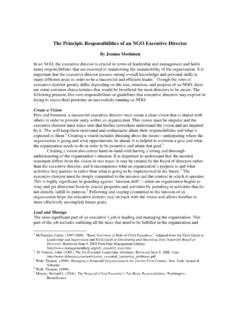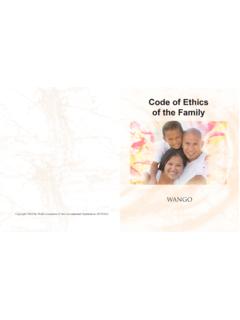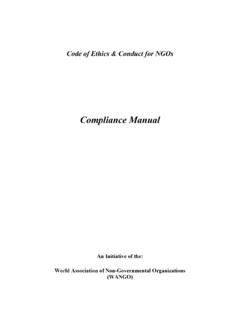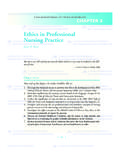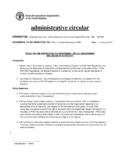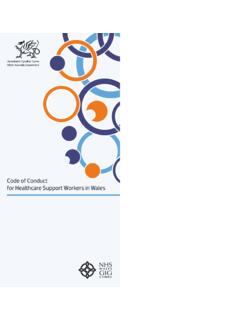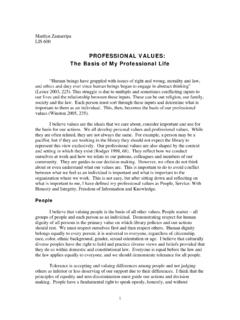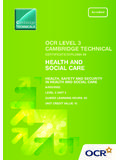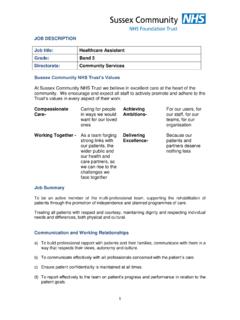Transcription of Code of Ethics and Conduct for NGOs
1 code of Ethics & Conduct for ngos Compliance Manual An Initiative of the: World Association of Non-Governmental Organizations (WANGO) Preface The Compliance Manual is designed as a tool to help ngos assess whether their policies and practices are currently in alignment with the code of Ethics & Conduct for ngos . The code of Ethics and Conduct for ngos is a set of fundamental principles, operational principles, and standards to guide the actions and management of non-governmental organizations. Developed under the auspices of the World Association of Non-Governmental Organizations (WANGO), the code was formulated by an international committee representing the wide spectrum of the non-governmental community and included input from NGO leaders from all regions of the world.
2 Numerous standards and codes of Conduct and Ethics from ngos and NGO associations worldwide were consulted in formulating this code . The code of Ethics and Conduct for ngos is designed to be broadly applicable to the worldwide NGO community. It applies whether the organization is a mutual benefit NGO, involving an association concerned with improving the situation of its membership, or a public benefit NGO, which is working for the improvement of conditions of society as a whole or of a segment of society. The code is applicable for organizations focused on international agendas as well as those seeking to improve local community affairs, and both Northern and Southern ngos .
3 The code s standards are applicable regardless of an NGO s focus, whether it be humanitarian relief, advocacy, conflict prevention, research, education, human rights monitoring, health care, environmental action, and so forth. All ngos , even the most sincere and selfless, can benefit from a code of Ethics and Conduct that systematically identifies ethical practices and acceptable standards. The adoption and internal enforcement of a suitable code not only provides an ethical check for an NGO, it also serves as a statement to beneficiaries, donors and the public that the NGO takes seriously the importance of maintaining high standards.
4 Such a code can assist stakeholders in identifying and avoiding pretenders and irresponsible ngos . The Compliance Manual is designed to be used as both a checklist and a catalyst for discussion for NGO staff to review, reflect, and discuss core principles, standards and ways of conducting services and activities. It also forms the basis for self-certification of the NGO. I. Guiding Principles Every actor operates on the basis of fundamental principles, whether plainly stated or implicitly understood. Further, an examination of organizations that are held in universal esteem reveals a great commonality in these principles.
5 In other words, to a great extent, good ngos from throughout the world tend to share the same fundamental assumptions or beliefs that make their successful operation possible. The following is an articulation of the more important of these shared fundamental principles. A. Responsibility, Service, and Public Mindedness Sustainable progress, peace, and justice require that all organizations contribute to the common good. Thus, an NGO should integrate self-development and service to others, balancing individual and public concerns, focusing on higher, broader, and more public levels of service. Standards Responsibly maintaining itself, an NGO should Conduct its activities for the sake of others, whether for the public at large or a particular segment of the public.
6 Public money must not be misused for selfish purposes and all public assets are to be treated with utmost seriousness, as a public trust. An NGO should recognize that its Conduct and activities impact on the public s perception of ngos and that it shares responsibility for the public s trust of ngos . An NGO should exhibit a responsible and caring attitude toward the environment in all of its activities. Evaluation 1. Does the organization Conduct activities for the purpose of serving others, either the public at large or a particular segment of the public? Yes No What are some examples of how you serve others?
7 _____ _____ _____ 2. Are public monies and public assets treated with utmost serious and not misused for selfish purposes? Yes No 3. Does the organization recognize that the way it conducts itself and its activities reflect on the public s perception of ngos and that it shares responsibility for the public s trust of ngos ? Yes No 4. Does the organization exhibit a responsible attitude toward the environment in all activities? Yes No How does your organization demonstrate a responsible attitude toward the environment? _____ _____ _____ If you answered no to any question, please explain why?
8 _____ _____ _____ B. Cooperation Beyond Boundaries Significant progress toward world peace and global well-being can be fostered through inter-religious, intercultural, and interracial work, and across artificial barriers of politics and ethnicity that tend to separate people and their institutions. ngos should maintain ethical, cooperative relationships with other ngos , and should partner where possible and appropriate for the sake of the greater public good.. Standards An NGO should be willing to work beyond borders of politics, religion, culture, race and ethnicity, within the limits of the organizing documents and with organizations and individuals that share common values and objectives.
9 Evaluation 1. Does the organization work beyond borders of politics, religion, culture, race and ethnicity, within the limits of the organizing documents and with organizations and individuals that share common values and objectives? Yes No If you answered no, please explain why: _____ _____ _____ C. Human Rights and Dignity As the Universal Declaration of Human Rights states, "All human beings are born free and equal in dignity and rights, are endowed with reason and conscience, and should act towards one another in a spirit of brotherhood." (Universal Declaration of Human Rights, Article 1) The family is the fundamental natural group unit of society promoting human rights and human dignity.
10 (Universal Declaration of Human Rights, Article 16) . Standards An NGO should not violate any person s fundamental human rights, with which each person is endowed. An NGO should recognize that all people are born free and equal in dignity. An NGO should be sensitive to the moral values, religion, customs, traditions, and culture of the communities they serve. An NGO should respect the integrity of families and support family-based life. Evaluation 1. Does the organization respect each person s fundamental human rights? Yes No 2. Does the organization recognize that all people are born free and equal in dignity?
